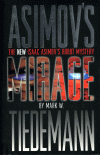Mirage is a mystery that involves the investigation of the massacre intended to halt talks of a treaty between Earth and Spacer worlds. Derec Avery, from the Robot City series, starts an investigation to determine why both the Resident Intelligence in charge of security and his new experimental robot bodyguard Bogard failed. Early on there seems to be a conspiracy. Derec and Ariel, which have parted ways since Robots and Aliens, are forced to work together to find out who is behind the attack. What follows is an investigation with twists at almost every turn.
It is hard for me to write a review of Mirage without comparing it to the Robot City/Aliens series. Back when I first read this book I had not read any of the Robot City/Alien series so I had no preconceptions about Derec or Ariel. One thing which I found odd while reading in chronological order was that Ariel’s last name is Burgess. Back in the first Robot City books Ariel went by the name Katherine Burgess, until it was revealed that she had suffered from the Pneumonic Plague. She then went by Ariel Welsh which was her birth name. Aside from the obvious continuity issue of what exactly happened to these robot cities, I think that Mirage is very enjoyable novel. Content-wise Mirage is about the equivalent of any two Robot City books put together. The fact that there is a distinct beginning and end coupled with a continuing back story makes this book more interesting to me. I can’t wait to re-read the next two in this series.

